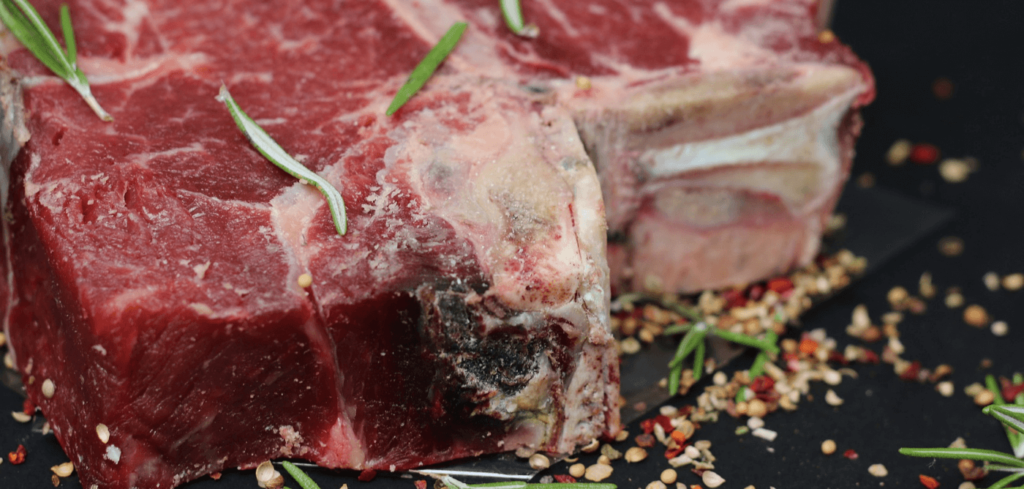
Everybody knows that dogs love chewing on things…
And beef bones are at the top of the list when it comes to objects that dogs enjoy munching on…
But what if your dog swallowed a beef bone while he was chewing on it? Will it end up being harmless or should you be concerned about your dog’s health and safety…
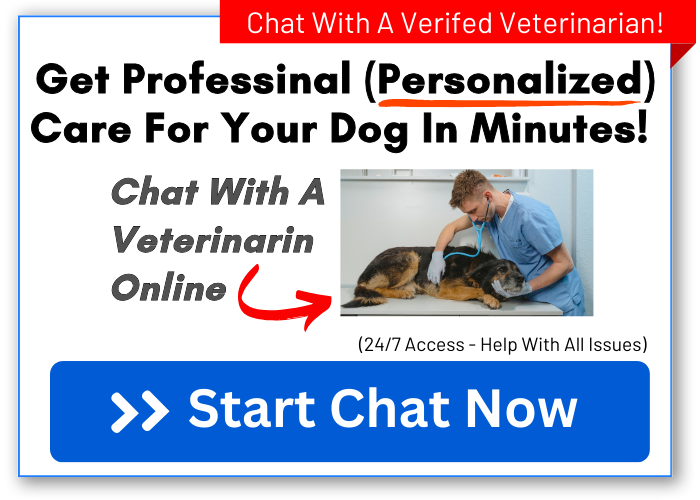
This article will answer that question, and by the end of it, you’ll know why you should be concerned if your dog swallowed a bone and exactly what you need to do when the scenario occurs…
My Dog Swallowed A Beef Bone… Should I Be Worried?
Swallowing a beef bone can cause perforations in your dog’s digestive system and can potentially cause an intestinal obstruction. Because of that, you should check your dog for signs of distress such as vomiting, diarrhea, and gagging, and contact a vet as soon as possible…
Other symptoms that you should be on the lookout for include the following:
- Coughing
- Gagging
- Diarrhea (especially with blood)
- Lethargy
- Vomiting (especially with blood)
- Excessive lip licking
- Strained defecation
- Loss of appetite
- Inability to sit
- Bloody stool
Again, if you notice any of these symptoms, you should contact a vet immediately for guidance.
What Ways Will A Beef Bone Hurt A Dog?
Even though beef bones might not cause any problems, especially when they’re small and relatively smooth, there is the potential for some very serious problems in your dog’s gastrointestinal tract.
For example, beef bones can break and form sharp edges, especially if your dog chews on them before swallowing…
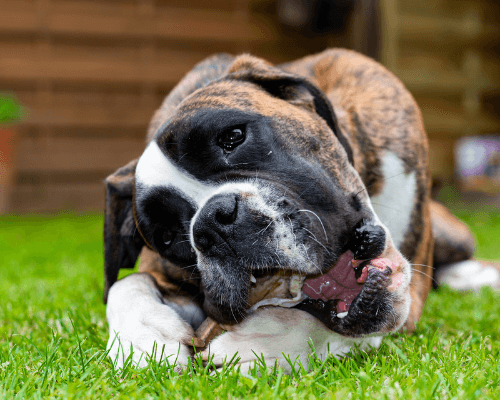
…and these sharp edges can cause internal cuts and bleeding inside your dog’s esophagus, stomach, and intestines.
In addition to that, large bones or pieces of bones can cause an obstruction in your dog’s intestines or colon, which is an extremely dangerous situation.
So whether it’s a bone from a delicious T-bone steak that you just had for dinner or a few beef ribs you just devoured, your dog should not be allowed to gnaw on the bone afterward.
Can Dogs Eat Cooked Beef Bones?
No, dogs shouldn’t eat cooked beef bones. For one, cooking the bone eliminates its nutritional value, so your dog doesn’t get any benefit out of it unless there is still some meat on it or marrow inside.
Not to mention, cooked bones can become very brittle, and as a result, they become prone to splintering if your dog chews on them.
In fact, one of the worst things that can happen is that your dog swallows sharp pieces of bone which can cause perforations in his throat, stomach, and intestines as they travel through his system…
And because your dog may vomit after swallowing pieces of a beef bone, those sharp pieces can cause internal cuts on the way back up as well.
There is also the possibility that a beef bone or pieces of the bone can cause an intestinal obstruction which is life-threatening and will require that your dog undergo surgery.
On top of all that, there’s also the obvious fact that swallowing a beef bone is a choking hazard for your dog.
So because of the potential for all these very serious issues, if your dog swallowed a cooked beef bone, you should contact a vet as soon as possible…

What About Raw Beef Bones?
When it comes to feeding your dog raw beef bones, there are basically two schools of thought…
One school says that raw beef bones are healthy for dogs because they still contain nutrients, because wild dogs eat bones raw, and because raw bones aren’t brittle like cooked bones (so they are much less likely to splinter)…
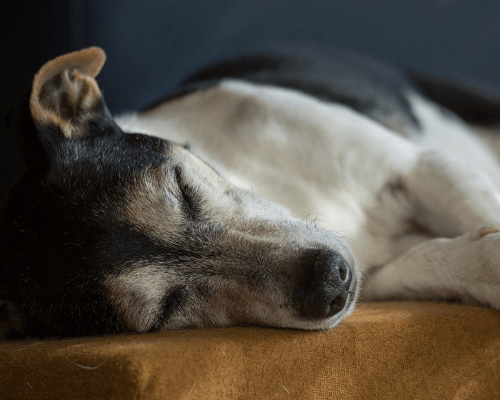
The other school says that you should avoid allowing your dog to eat or swallow raw bones as well as cooked bones because of the potential for food poisoning.
For example, raw beef bones can contain bacteria like E-coli, Campylobacter, and Salmonella which can all cause digestive problems for dogs just as they can for us humans.
On top of that, if your dog swallows a raw beef bone, there is still the potential for it to create an obstruction, which again will require surgery for your dog, and it’s also still a choking hazard.
You should contact a vet if you’re uncertain over which school of thought you fall into, but the safer option is to simply avoid giving your dog raw beef bones, just as you would avoid things like raw chicken and fish bones.
Can Dogs Break Down Beef Bones In Their Stomachs?
Yes, your dog’s stomach can dissolve bones to a certain degree. Dogs have a high acidity level in their stomach, so they’re capable of dissolving food that’s barely chewed and even some bones.
Typically, small bones will be digested faster and easier, and hopefully, they will pass without any issues.
It’s also worth noting that dogs who regularly feed on raw bones have more acidic stomachs. So, their bodies can digest bones better and faster than dogs who are only fed kibble.
How Long Does It Take For A Dog To Pass A Bone?
Your dog should take 8–12 hours to pass a bone. If it takes longer than that, you may want to start monitoring your dog for signs of blockage.
Look for symptoms like:
- Signs of weakness
- Diarrhea
- Vomiting
- Signs of abdominal pain
- Straining to defecate
- Loss of appetite
- Dehydration
- Bloating
- Whining
- Hunching or bad posture
If you notice any of these symptoms, you should contact a vet immediately…

How To Prevent Your Dog From Swallowing Beef Bones In The Future…
If you want to prevent your dog from swallowing beef bones, there are several things you can do.
First of all, try to dispose of the bones, once you’re done eating, in a way that your dog will never be able to get to them.
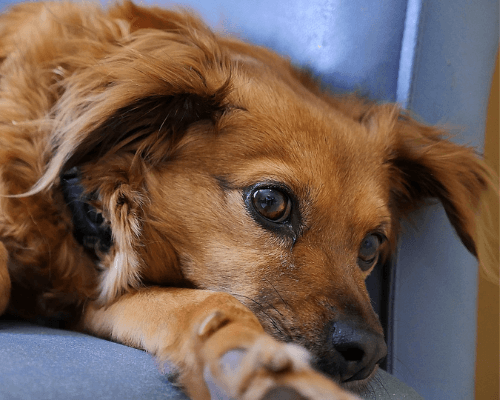
Dog’s have been known to tip over trash cans to get to thrown out bones and food. So one thing you can do before throwing out beef bones is to put them in a plastic bag that is tied up tightly.
On top of that, you can redirect your dog’s desire to chew on bones by giving him appropriate chew toys and toys such as kongs and nylabones…
All that being said, one of the best things you can do to prevent your dog from swallowing any foreign objects is proper obedience training…
Now if you want to train your dog and don’t know where to start, I highly recommend you take a look at the Brain Training For Dogs program…
It’s a training program that gets results very quickly, is easy to follow, and can be accessed from the comfort of your own home…
The reason why it’s such a fast and effective training program is because it teaches you how to simply redirect the natural intelligence that your dog already has…
If you’d like to learn more about how Brain Training For Dogs can help you prevent your dog from swallowing foreign objects, click the link below…
>> Click Here To Learn How Brain Training For Dogs Can Help You!
How To Feed Your Dog Bones Safely…
If your dog is adamant about eating bones, and you’ve decided to allow him or her to chew on them, here are a few tips that might help keep your dog safe.
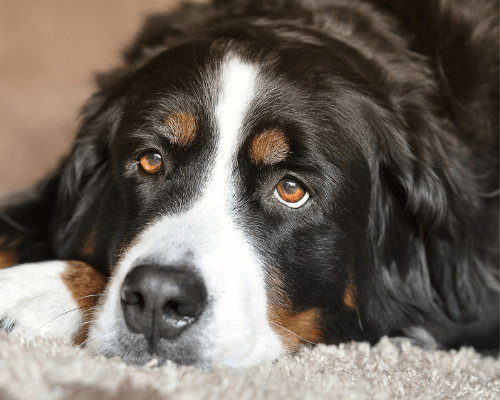
First of all, the beef bones must be raw. Cooked bones are a no-no for dogs for all the reasons I mentioned earlier in this article.
Some of the other precautions you should follow include:
- Defrosting frozen bones before offering them to your dog. Frozen bones are more likely to harm your dog’s teeth.
- Making sure the bones are fresh and not rotten.
- Making sure the bone is large enough not to fit in your dog’s mouth. This will prevent your dog from swallowing it and minimize it as a choking hazard.
- Limiting your dog’s bone chewing and intake to once or twice a week to prevent constipation.
- Not giving the bone to your dog when he’s hungry because he’ll likely chew on it much harder.
- Not letting your dog bury the bone before putting it in his mouth because it might get contaminated with bacteria.
- Not giving your dog bones if he or she has a history of pancreatitis or digestive issues.
Final Thoughts…
If your dog swallowed a beef bone, there are many health risks that you should be wary of such as choking, internal cuts in your dog’s stomach, throat, and intestines, and the possibility of intestinal obstruction…
Be sure to contact a vet immediately, and take measures such as proper obedience training to prevent your dog from swallowing bones again in the future.


